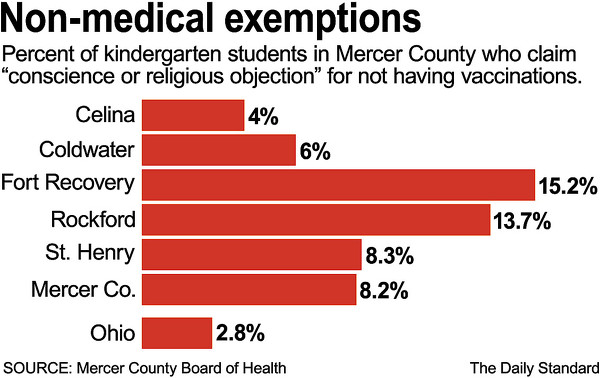Thursday, January 12th, 2023
Fear of the Shot
Pandemic, social media spur vaccine hesitancy
By Leslie Gartrell
CELINA - As a large measles outbreak in Columbus begins to subside, health officials are growing concerned that more parental resistance to routine childhood vaccinations will intensify a revival of preventable illnesses.
The vast majority of the 82 children infected in the Columbus outbreak were old enough to get the shots but were unvaccinated, according to information provided by Mercer County Health District Nursing Director Julie Shaffer.
Thirty-three children were hospitalized, and nearly half of the infected kids were between the ages of 1-2. No children have died.
The outbreak arrives at a time of increasing worry about the ramifications of vaccine hesitancy, which has been a long-standing problem in the U.S. and around the world.
Vaccine hesitancy has escalated over the past 10 years, reaching new levels in the context of the COVID-19 pandemic, according to an article from the New England Journal of Medicine published in July 2022.
When Shaffer first started working in pediatrics at Mercer County Community Hospital, Coldwater, several infants and children had Haemophilus influenzae meningitis, which can cause severe infections of both the lining of the brain and spinal cord.
"I started IVs and helped with lab draws and spinal taps on these infants and children… I saw the disease and complications from the bacteria," she said Wednesday. "As soon as the HIB vaccine was available in 1985, I made sure my oldest child had the vaccine."
For the past 18 years, Shaffer has administered vaccines at the health district and conducted vaccine-preventable investigations in the county.
In a whooping cough outbreak in the county from November 2015 through July 2016, Shaffer said she could hear children's coughs and stories from families as she worked.
"Vaccines are very effective; that is why parents do not see the complications of disease as in the past," she said. "I think it is very important for those of us who have seen disease and had ourselves and children vaccinated to reassure new parents they are protecting their children, not harming them."

Photo by Daily Standard Staff
Non-medical exemptions: Percent of kindergarten students in Mercer County who claim "conscience or religious objection" for not having vaccinations.
More than a third of parents with children under 18 - and 28% of all adults - now say parents should be able to decide not to vaccinate their school-age children for measles, mumps and rubella (MMR), even if remaining unvaccinated creates health risks for others, according to new polling by the Kaiser Family Foundation, a health care research nonprofit.
It's a stark increase from a 2019 Pew Research Center poll that found less than a quarter of parents and 16% of all adults opposed school vaccination requirements.
At the state level, 85.6% of Ohio kindergarteners had all their required immunizations during the 2021-2022 school year, according to information provided by Shaffer. About 88% of Mercer County kindergartners had all their vaccines during the same time period.
Approximately 2.8% of Ohio kindergarteners had a reason of conscience or religious objection to vaccines during the 2021-2022 school year. Comparatively, 8.2% of Mercer County kindergarteners had the same objection during the 2021-2022 school year.
Fort Recovery had the largest percentage of students with conscience or religious objections during the 2021-2022 school year at 15.2%, followed by Rockford, 13.7%; St. Henry, 8.3%; Coldwater, 6%; and Celina, 4%, per Shaffer's information.
No kindergarteners at Fort Recovery, Rockford or Coldwater had medical exemptions. Just over 7% of St. Henry kindergarteners had a medical exemption, while .005% of Celina kindergarteners had a medical exemption.
The decrease in support for MMR vaccine requirements for kids in public schools largely stems from people who identify or lean Republican, the Kaiser survey found, with 44% asserting parents should be able to forgo childhood vaccines, more than double the 20% reported in 2019.
At the same time, most of the public continue to have confidence in the benefits of the MMR vaccine. The Kaiser poll found that 71% of adults say healthy children should be required to get vaccinated for MMR in order to go to school, down from 82% who said the same in 2019.
Although vaccine hesitancy is not a new issue, the New England Journal of Medicine article states it has escalated in scope and scale due to social media platforms.
"The role of social media in fueling the spread of vaccine hesitancy and its increasingly documented health consequences cannot be overstated," the article reads.
At the 2020 Munich Security Conference, WHO Director-General Tedros Adhanom Ghebreyesus called attention to the fact that alongside efforts to control the spread of COVID, health officials were faced with a challenging "infodemic" to control.




